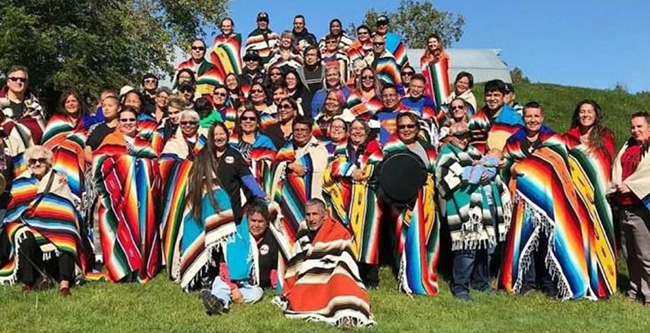‘I’m not the only one’: Reflections of a Sixties Scoop survivor

By Christine Miskonoodinkwe-Smith
I took part in the third annual National Bi-Giwen Indigenous Survivors of Child Welfare Gathering earlier this fall at Waupoos Farm in Ottawa. It was an experience for me that I won’t forget because it allowed me to connect with at least 70 to 80 other survivors of the Sixties Scoop and Child Welfare System.
The Canadian state has long had an assimilation practice in which large numbers of First Nations children have been removed from their families and adopted into families of non-native parents. The highest peak of adoption occurred in the 60’s, which was known as the Sixties Scoop. The practice continued in a large degree into the 70’s and early 80’s. and was known as the Sixties Scoop. This practice led to intense identity consequences for those who became the “product” of interracial adoption, something the Canadian government did not consider.
Often when you are an adoptee or a survivor of the child welfare system, you feel alone. You feel this way because when you are taken away from family and community, you are lost to the traditions, languages and the community of your people. It is through gatherings such as the third annual National Bi-Giwen Indigenous Survivors of Child Welfare that you truly feel you belong and that you matter.
I remember when I first got on the train, to go to the gathering, how nervous I was. My heart was beating like crazy. I could feel all my muscles tensing up because I was heading somewhere new, and it had only been a month since my biological mother had passed. My feelings were raw, and I didn’t know how I was going to handle the gathering because it hit so close to home. I am a Sixties Scoop survivor and a child welfare survivor.
There were workshops that we could choose to attend or not attend. The facilitators left it up to us to what we felt comfortable in attending. I attended the rattle making workshop, with Al Harrington, who hails from Shoal Lake ON, Ojibway Nation where I made my first ever rattle. I went to a feather bundle workshop with Dawn Setford, from an organization called Pass the Feather. The feather bundle workshop was the most incredible workshop because I learned about the different feathers I was working with, and made my first feather bundle, that now proudly sits in my living room, waiting for its first use.
There were a lot of firsts for me at this gathering. Another first was attending a Grief and Healing Circle with Dr. Raven Sinclair. In the Grief and Healing workshop, I shared my story for the first time. Sharing my story was important because I have kept it inside and there were aspects of it that I have never spoken of. Things like, the abuse my biological mother suffered at the hands of my biological father, and how we were taken away. I told of how my biological father was murdered in 1990, and how I never got a chance to meet him. In fact, I only got to see his picture for the first time this past June. I spoke a little bit about the emotional, physical, and spiritual abuse I experienced at the hands of my adoptive parents. How that subsequently separated me from my sister for seven years when my adoptive parents put me back into the child welfare system at the age of ten because they decided they no longer wanted me. I literally poured my heart out and heard other people’s stories, too. They were like mine. I remember walking out of the Grief and Healing, feeling positive for the first time since I had walked onto the land of Waupoos Farm. The most beautiful parts of the Gathering were the friends I made, I felt like part of a huge family, and though I didn’t cry, I wanted to. At the end of the gathering we were all gifted beautiful blankets and blanketed.
It is gatherings like this, that help you to feel that, in the words of organizer Colleen Cardinal “I’m not the only one”.


